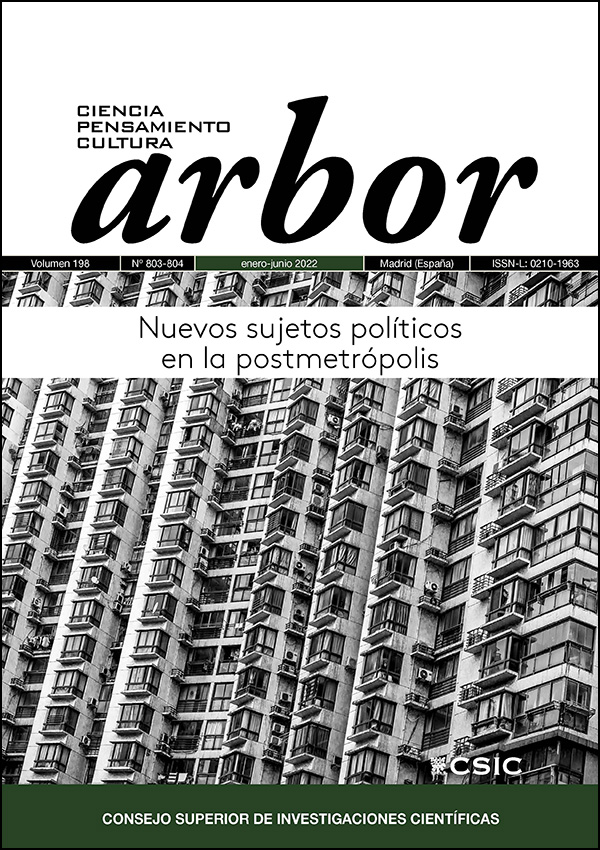Redefinitions of the political. Feminist democracy and the interest of “women”
DOI:
https://doi.org/10.3989/arbor.2022.803-804007Keywords:
feminist democracy, representative democracy, public space, strikeAbstract
While Carole Pateman (1988) states that “for feminists democracy has never existed”, Julieta Kirkwood (1986) argues that “there is no democracy without feminism”. Both refer to the debt of the democratic ideal with the emancipation of women and even to the structural role of the exclusion of women in liberal democracy. Based on the encounters and disagreements between democracy and feminism, this article aims to offer a definition of feminist democracy that goes beyond inclusion through affirmative action. That’s why we have to address the tensions this creates in the feminist debate of recent decades and the new challenges around policies on redistribution and recognition. Is it possible to overcome oppression and domination through policies focused on group interest? How is this interest defined without essentialising the difference? Answering these questions is key to proposing an effective concept of feminist democracy.
Downloads
References
Balibar, Étienne (2013). Ciudadanía. Madrid: Adriana Hidalgo Editora.
Beard, Mary (2017). Women & Power: A Manifesto. London: Profile Books.
Cámara, Julia (2016). Entrevista a Cinzia Arruzza: «Existe el peligro de transformar el feminismo en una actitud individual». Viento Sur, 148: 23-31.
Castillo, Alejandra (2018). Nudos Feministas (2.ª ed.). Santiago de Chile: Palinodia.
Castillo, Alejandra (2016). Disensos feministas. Santiago de Chile: Palinodia.
Constant, Benjamin (1988). Del espíritu de conquista. Madrid: Tecnos.
Federici, Silvia (2018). El patriarcado del salario. Críticas feministas al marxismo. Madrid: Traficantes de Sueños.
Fraser, Nancy (1995). From redistribution to recognition? Dilemmas of justice in a 'post-socialist' age. New Left Review I (212): 68-93.
Fraser, Nancy (1996). Rethinking the Public Sphere. En: Craig Calhoun (ed.). Habermas and the Public Sphere. Cambridge: MIT Press.
Fraser, Nancy (2013). Fortunes of Feminism: From State-Managed Capitalism to Neoliberal Crisis. London: Verso.
Fraser, Nancy (2020). Los talleres ocultos del capital. Madrid: Traficantes de Sueños.
Fraser, Nancy y Gordon, Linda (1992). Contract vs. charity. Why is there no social citizenship in the United States? Socialist Review, 22 (3): 45-67.
Gago, Verónica (2019). La potencia feminista. Madrid: Traficantes de Sueños.
Hernando, Almudena (2018). La fantasía de la individualidad: sobre la construcción sociohistórica del sujeto moderno. Madrid: Traficantes de Sueños.
Hirschmann, Nancy J. (1992). Rethinking Obligation: A Feminist Method for Political Theory. Ithaca: Cornell University Press. https://doi.org/10.7591/9781501725647
Kirkwood, Julieta (1986). Ser política en Chile: las feministas y los partidos. Facultad Latinoamericana de Ciencias Sociales (FLACSO).
Librería Mujeres de Milán (2008). No creas tener derechos. Madrid: Editorial Horas y Horas.
Lovenduski, Joni (2019). 3. Feminist Reflections on Representative Democracy. The Political Quarterly, 90 (S1): 18-35. https://doi.org/10.1111/1467-923X.12563
Mill, John Stuart (2015). On Liberty, Utilitarianism and Other Essays. Oxford University Press. https://doi.org/10.1093/owc/9780199670802.001.0001
Pateman, Carole (1988). The Sexual Contract. Stanford University Press.
Phillips, Anne (1995). The Politics of Presence. Oxford: Oxford University Press.
Phillips, Anne (ed.) (1998). Feminism and Politics. Oxford University Press.
Phillips, Anne (6 septiembre 2017). The Politics of Presence: Do Politicians Represent Us? LSE Government Blog. Disponible en: https://blogs.lse.ac.uk/government/2017/09/06/the-politics-of-presence-do-politicians-represent-us/
Pitkin, Hanna F. (1967). The Concept of Representation. Berkeley: University of California Press.
Pitkin, Hanna F. (1981). Justice: On Relating Private and Public. Political Theory 9 (3): 327-352. https://doi.org/10.1177/009059178100900304
Rousseau, Jean-Jacques (1996). Carta a d'Alembert. Santiago de Chile: Lom Ediciones.
Superson, Anita M. (2000). Deformed Desires and Informed Desire Tests. Hypatia 20 (4): 109-126. https://doi.org/10.1353/hyp.2005.0134
Young, Iris Marion (1990). Justice and the Politics of Difference. Princeton: Princeton University Press.
Young, Iris Marion (2000). Inclusion and Democracy. Oxford, New York: Oxford University Press.
Published
How to Cite
Issue
Section
License
Copyright (c) 2022 Consejo Superior de Investigaciones Científicas (CSIC)

This work is licensed under a Creative Commons Attribution 4.0 International License.
© CSIC. Manuscripts published in both the printed and online versions of this Journal are the property of Consejo Superior de Investigaciones Científicas, and quoting this source is a requirement for any partial or full reproduction.
All contents of this electronic edition, except where otherwise noted, are distributed under a “Creative Commons Attribution 4.0 International” (CC BY 4.0) License. You may read the basic information and the legal text of the license. The indication of the CC BY 4.0 License must be expressly stated in this way when necessary.
Self-archiving in repositories, personal webpages or similar, of any version other than the published by the Editor, is not allowed.
Funding data
Agencia Nacional de Investigación y Desarrollo
Grant numbers 11190901














